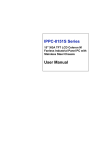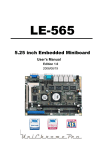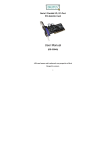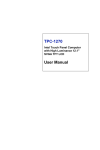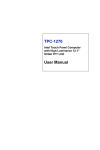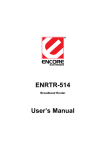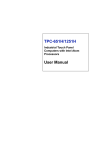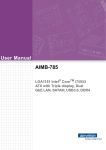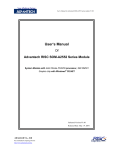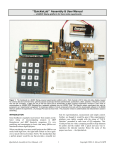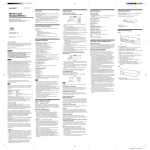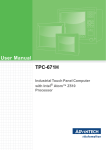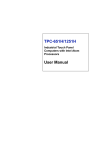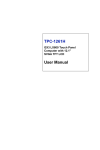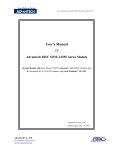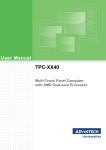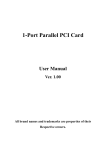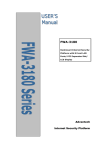Download TPC-1770/1780 User Manual
Transcript
TPC-1770/1780 Intel Touch Panel Computer with High Luminance 17" SXGA TFT LCD User Manual Copyright The documentation and the software included with this product are copyrighted 2008 by Advantech Co., Ltd. All rights are reserved. Advantech Co., Ltd. reserves the right to make improvements in the products described in this manual at any time without notice. No part of this manual may be reproduced, copied, translated or transmitted in any form or by any means without the prior written permission of Advantech Co., Ltd. Information provided in this manual is intended to be accurate and reliable. However, Advantech Co., Ltd. assumes no responsibility for its use, nor for any infringements of the rights of third parties, which may result from its use. Acknowledgements Intel and Pentium are trademarks of Intel Corporation. Microsoft Windows and MS-DOS are registered trademarks of Microsoft Corp. All other product names or trademarks are properties of their respective owners. Part No. 2003177001 2nd Edition Printed in Taiwan January 2009 TPC-1770/1780 User Manual ii Product Warranty (2 years) Advantech warrants to you, the original purchaser, that each of its products will be free from defects in materials and workmanship for two years from the date of purchase. This warranty does not apply to any products which have been repaired or altered by persons other than repair personnel authorized by Advantech, or which have been subject to misuse, abuse, accident or improper installation. Advantech assumes no liability under the terms of this warranty as a consequence of such events. Because of Advantech’s high quality-control standards and rigorous testing, most of our customers never need to use our repair service. If an Advantech product is defective, it will be repaired or replaced at no charge during the warranty period. For out-of-warranty repairs, you will be billed according to the cost of replacement materials, service time and freight. Please consult your dealer for more details. If you think you have a defective product, follow these steps: 1. Collect all the information about the problem encountered. (For example, CPU speed, Advantech products used, other hardware and software used, etc.) Note anything abnormal and list any onscreen messages you get when the problem occurs. 2. Call your dealer and describe the problem. Please have your manual, product, and any helpful information readily available. 3. If your product is diagnosed as defective, obtain an RMA (return merchandize authorization) number from your dealer. This allows us to process your return more quickly. 4. Carefully pack the defective product, a fully-completed Repair and Replacement Order Card and a photocopy proof of purchase date (such as your sales receipt) in a shippable container. A product returned without proof of the purchase date is not eligible for warranty service. 5. Write the RMA number visibly on the outside of the package and ship it prepaid to your dealer. iii Declaration of Conformity CE This product has passed the CE test for environmental specifications when shielded cables are used for external wiring. We recommend the use of shielded cables. This kind of cable is available from Advantech. Please contact your local supplier for ordering information. FCC Class A Note: This equipment has been tested and found to comply with the limits for a Class A digital device, pursuant to part 15 of the FCC Rules. These limits are designed to provide reasonable protection against harmful interference when the equipment is operated in a commercial environment. This equipment generates, uses, and can radiate radio frequency energy and, if not installed and used in accordance with the instruction manual, may cause harmful interference to radio communications. Operation of this equipment in a residential area is likely to cause harmful interference in which case the user will be required to correct the interference at his own expense. Technical Support and Assistance Step 1. Visit the Advantech web site at www.advantech.com/support where you can find the latest information about the product. Step 2. Contact your distributor, sales representative, or Advantech's customer service center for technical support if you need additional assistance. Please have the following information ready before you call: - Product name and serial number - Description of your peripheral attachments - Description of your software (operating system, version, application software, etc.) - A complete description of the problem - The exact wording of any error messages TPC-1770/1780 User Manual iv Safety Instructions 1. Read these safety instructions carefully. 2. Keep this User's Manual for later reference. 3. Disconnect this equipment from any AC outlet before cleaning. Use a damp cloth. Do not use liquid or spray detergents for cleaning. 4. For plug-in equipment, the power outlet socket must be located near the equipment and must be easily accessible. 5. Keep this equipment away from humidity. 6. Put this equipment on a reliable surface during installation. Dropping it or letting it fall may cause damage. 7. The openings on the enclosure are for air convection. Protect the equipment from overheating. DO NOT COVER THE OPENINGS. 8. Make sure the voltage of the power source is correct before connecting the equipment to the power outlet. 9. Position the power cord so that people cannot step on it. Do not place anything over the power cord. 10. All cautions and warnings on the equipment should be noted. 11. If the equipment is not used for a long time, disconnect it from the power source to avoid damage by transient overvoltage. 12. Never pour any liquid into an opening. This may cause fire or electrical shock. 13. Never open the equipment. For safety reasons, the equipment should be opened only by qualified service personnel. 14. If one of the following situations arises, get the equipment checked by service personnel: a. The power cord or plug is damaged. b. Liquid has penetrated into the equipment. c. The equipment has been exposed to moisture. d. The equipment does not work well, or you cannot get it to work according to the user's manual. e. The equipment has been dropped and damaged. f. The equipment has obvious signs of breakage. 15. DO NOT LEAVE THIS EQUIPMENT IN AN ENVIRONMENT WHERE THE STORAGE TEMPERATURE MAY GO BELOW v 20° C (-4° F) OR ABOVE 60° C (140° F). THIS COULD DAMAGE THE EQUIPMENT. THE EQUIPMENT SHOULD BE IN A CONTROLLED ENVIRONMENT. 16. CAUTION: DANGER OF EXPLOSION IF BATTERY IS INCORRECTLY REPLACED. REPLACE ONLY WITH THE SAME OR EQUIVALENT TYPE RECOMMENDED BY THE MANUFACTURER, DISCARD USED BATTERIES ACCORDING TO THE MANUFACTURER'S INSTRUCTIONS. The sound pressure level at the operator's position according to IEC 7041:1982 is no more than 70 dB (A). DISCLAIMER: This set of instructions is given according to IEC 704-1. Advantech disclaims all responsibility for the accuracy of any statements contained herein. TPC-1770/1780 User Manual vi Contents Chapter Chapter 1 General Information ....................................... 2 1.1 1.2 Introduction ....................................................................... 2 Specifications .................................................................... 2 1.3 1.4 1.5 1.6 LCD Specifications ........................................................... 4 Touchscreen Specifications............................................... 5 Power................................................................................. 5 I/O Port Arrangement........................................................ 6 1.7 Panel Mounting ................................................................. 7 1.8 Dimensions & Cutout........................................................ 8 1.2.1 1.2.2 1.2.3 System Kernel ................................................................ 2 I/O Ports ......................................................................... 3 Safety and Environment ................................................. 3 Figure 1.1:I/O Port Arrangement ................................... 6 Figure 1.2:Panel Mounting ............................................ 7 Figure 1.3:Dimensions ................................................... 8 2 System Setup.................................................. 10 Figure 2.1:Install CompactFlash memory card ............ 10 Figure 2.2:Power connector ......................................... 10 Figure 2.3:Power Receptor .......................................... 11 Figure 2.4:Power Button .............................................. 11 Chapter 3 I/O Connector & Setting Mode ................... 14 3.1 Chapter CN1 (COM3, COM4), CN2A (COM1) ....................... 16 TPC-1780 ..................................................................... 17 COM1,COM3,COM4 : Serial port RS232 .................. 19 4 Software Configuration ................................ 22 4.1 Chapter TPC-1770 ........................................................................ 14 3.1.1 3.1.2 3.1.3 Utilities & Drivers........................................................... 22 4.1.1 4.1.2 4.1.3 4.1.4 4.1.5 Intel Chipset Software Installation Utility ................... 22 VGA Drivers (Intel(R) Graphics Driver) ..................... 22 LAN Driver .................................................................. 23 Touchscreen Driver ...................................................... 23 Audio Driver ................................................................ 23 5 Windows XP Embedded ............................... 26 5.1 5.2 5.3 EWF ................................................................................ 26 HORM............................................................................. 26 Advantech Utilities.......................................................... 27 5.3.1 5.3.2 5.3.3 Version Information ..................................................... 27 EWF Enable and Disable ............................................. 27 HORM ......................................................................... 28 Appendix A WDT Programming ...................................... 30 A.1 Overview ......................................................................... 30 vii Table of Contents A.2 Watchdog Timer Programming....................................... 31 A.3 Example Programs .......................................................... 32 Table A.1:Watchdog Runtime Registers ..................... 31 Appendix B HDD Kit Assembly........................................ 44 Figure B.1:Removing the Rear HDD Cover ................ 44 Figure B.2:Removing the Top Screws ......................... 44 Figure B.3:Installing the HDD ..................................... 45 Figure B.4:Pasting the Mylar ....................................... 45 Figure B.5:Attaching the HDD .................................... 46 Appendix C Fuse Specifications ........................................ 48 C.1 C.2 Fuse Specifications.......................................................... 48 Fuse Replacement ........................................................... 48 Figure C.1:Fuse Replacement ...................................... 48 TPC-1770/1780 User Manual viii CHAPTER 1 2 General Information Sections include: • Introduction • Specifications • LCD Specifications • Touchscreen Specifications • Power • I/O Ports Arrangement • Panel Mounting • Dimensions & Cutout Chapter 1 General Information 1.1 Introduction The TPC-1770/1780 TPC is state-of-the-art HMI. This 17" display operator interface is an x86-based platform with these key features: Fanless: By using a low power processor, the system does not have to rely on fans, which are unreliable, and cause dust to circulate inside the equipment. Bright Display: The bright TFT LCD display suits industrial demands for clear interfaces. Powerful Communication Capability: The TPC-1770/1780 provides powerful IO interface for easily communicating with other devices. The IO interface includes serial ports, Ethernet and USB 2.0 support. Embedded Windows Support: In addition to the OS support of Windows XP, Advantech offers platform support for XP embedded. 1.2 Specifications 1.2.1 System Kernel Item TPC-1770H TPC-1780H CPU BIOS Intel® Celeron M 1GHz w/ 0 L2 cache Award 4MB Intel® Core 2 Duo L7400 1.5GHz w/ 4M L2 cache Award 4MB North Bridge 915GME 945GME South Bridge ICH6M ICH7M-DH Memory DIMM 240pin DDR2 400MHz, Single Channel, Default 512MB, Up to 2G CF Card Slot x 1 (TYPE Ⅱ ) 2.5" SATA x 1 SO-DIMM 200pin DDR2 533MHz, Dual Channel, Default 512MB x 2, Up to 4G CF Card Slot x 1 (TYPE Ⅱ ) 2.5" SATA x 1 Super I/O SMSC SCH3114, Interval 1sec Super I/O SMSC SCH3114, Interval 1sec Storage Watchdog timer TPC-1770/1780 User Manual 2 1.2.2 I/O Ports Item TPC-1770H TPC-1780H I/O port 10/100/1000 Base-T x 2, (Realtek RTK8111B) 10/100/1000 Base-T x 2, (Realtek RTK8111B) RS-232 x 3 (COM1, COM3, COM4) RS-232 x 3 (COM1, COM3, COM4) VGA x 1 VGA x 1 USB 2.0 x 4 USB 2.0 x 4 PS/2 Mouse interface x 1 PS/2 Mouse interface x 1 Expansion Bus PS/2 Keyboard interface x1 PS/2 Keyboard interface x1 Mic-in, Line-in, Line-out (AC97) Mic-in, Line-in, Line-out (AC97) PCI PCI-E x1 2ports SDVO LPC USB 2ports SMBUS GPIO Support: NO SerIRQ: Yes PCI PCI-E x1 4ports SDVO LPC USB 2ports SMBUS GPIO Support: 2 SerIRQ: Yes 1.2.3 Safety and Environment Safety FCC Class A and CE certified BSMI certified UL certified The front bezel is compliant with NEMA 4 Environment Operating Temperature: 0~45° C Storage Temperature: -20~70° C Humidity: 10~95% @ 40 relative humidity (non-condensing) Vibration: 1Grms (5~500Hz) 3 Chapter 1 1.3 LCD Specifications Display Type TFT color LCD Size (diagonal) 17” Maximum Resolution 1280 x 1024 (SXGA) Maximum colors 16.7M colors (RGB 6-bit + FRC data) Pixel Pitch (W x H) 0.264 x 0.264 mm Viewing Angle 160° (H), 160° (V); CR>=10 Luminance (cd / m2) 300 Contrast Ratio 800:1 Operating Temperature 0~50° C (Ambient) Backlight 4 CCFL Backlight Life Time 50,000 hours Note There might be several bright or dark pixels on the LCD. This comes from the production of the LCD. Such phenomenon is claimed to be normal according to the LCD manufacturers. TPC-1770/1780 User Manual 4 1.4 Touchscreen Specifications Touchscreen Type Resistive Base Glass Construction Tempered Glass Resolution 1024 x 1024 Light Transmission 80% typical Controller USB Interface Power Rating 3.3 to 5V Durability 1 million touches 1.5 Power Input voltage: 18 ~ 32 Vdc, 5.55-3.12A Max (the fuse will be open circuit as input level exceeds 33Vdc) 5 Chapter 1 1.6 I/O Port Arrangement The arrangement of the I/O ports is shown in Figure 1.1. Figure 1.1: I/O Port Arrangement TPC-1770/1780 User Manual 6 1.7 Panel Mounting 1. There is a piece of adhesive waterproof gasket on the AL front bezel. Make sure the waterproof gasket is in position before installing the TPC-1770/1780 to the panel opening. 2. Install the TPC-1770/1780 to the panel opening. 3. Find out the ten clampers and ten long screws in the accessory pack. Hook those clampers to those holes around the four sides of the bezel. Insert the screws to every clamper and fasten them. These screws will then push on the mounting panel and fix the unit. 4. The mounting panel thickness is suggested to be less than 5.5mm (0.216 inch). Figure 1.2: Panel Mounting 7 Chapter 1 1.8 Dimensions & Cutout Weight: 8 Kg (without HDD) Dimensions: 414 x 347.5 x 93 mm (16.3" x 13.68" x 3.66") (WxHxD) Cutout: 400.8 x 334.3 mm (suggested) Figure 1.3: Dimensions TPC-1770/1780 User Manual 8 CHAPTER 2 2 System Setup Chapter 2 System Setup This chapter provides a brief explanation for operating the TPC-1770/ 1780. It is easy to make the TPC-1770/1780 start working with the below step-by-step. Step 1: Unpack the TPC-1770/1780 package. Please check the packing list at the beginning of this manual. Step 2: Install a CompactFlash containing Windows XP Embedded or other operating system. Figure 2.1: Install CompactFlash memory card Warning It is suggested to turn OFF system power as plug in or pull out the memory card, though the CompactFlash memory is supposed to be hot swappable. Step 3: Connect the power connector to the 24VDC power lines. The power lines can either be of some power adapter or in-house power source. Figure 2.2: Power connector TPC-1770/1780 User Manual 10 Figure 2.3: Power Receptor Step 4: Plug the power lines to the system power receptor. Step 5: Push the power button to power on the system as the figure 2.4. Figure 2.4: Power Button 11 Chapter 2 TPC-1770/1780 User Manual 12 3 CHAPTER 2 I/O Connectors & Setting Mode Chapter 3 I/O Connector & Setting Mode 3.1 TPC-1770 TPC-1770/1780 User Manual 14 CN1A COM3 RS-232 COM 3 CN1B COM4 RS-232 COM4 CN2A COM1 RS-232 COM1 CN2B VGA port Connector to VGA output CN3 Audio Jack Connector to Audio CN4 PS/2 KB/MS PS/2 connector for KB/MS CN5A LAN1 RTL8111B CN5B, CN5C USB1, USB2 USB port CN6A LAN2 RTL8111B CN6B, CN6C USB3, USB4 USB port CN8 USB 5 USB optional port CN9 USB 6 USB optional port CN12 IDE Connector 2.5î IDE connector CN13 ATX Connector ATX power input CN14 Inverter connector Inverter power output CN15 Touch connector Connector Touch sensor CN16 LVDS Connector Connector LVDS panel CN18 FAN connector Connect CPU FAN CN19 PANSWIN Connector PW01 SA1 SATA Connector SATA connector 1 SA2 SATA Connector SATA connector 2 JP2 LCD resolution LCD resolution selection JP3 CMOS clear Clear CMOS 15 Chapter 3 3.1.1 CN1 (COM3, COM4), CN2A (COM1) Serial Port RS232 Connector Definitions 1 5 6 9 PIN RS-232 1 2 3 4 5 6 7 8 9 NDCD NRX NTX NDTR GND NDSR NRTS NCTS NRI TPC-1770/1780 User Manual 16 3.1.2 TPC-1780 CN15 CN2 CN21 CN12 CN3 CN4 CN18 CN19 CN20 JP1 CN16 CN9 SA1 CN8 SA2 CN11 CPU CN1 II JP2 JP3 JP4 ICH7M-DH I 945GME GF1 CN13 CLK GF2 CN14 CN17 CN5 CN7 CN6 CN10 CN1 CN9 R41 CN3 CN2 CN7 4 CN6 3 CN10 CN8 2 1 CN5 5 17 Chapter 3 CON. # Function Description CN1 CN2 CN3 DDR2 SO-DIM*2 INVERTER INVERTER VRCtrl CN4 CN5 CN6 LVDS VGA + COM1 LAN1 + USB*2 Up to 4GB TDK TBD266LR-1 Control inverter brightness by Digital VR DS1804 Dual channels LVDS VGA + Full DB9 Serial Port COM1 CN7 LAN2 + USB*2 CN8 CN9 CN10 CN11 CN12 CN13 CN14 CN15 CN16 USB USB AUDIO BUZZER SELECT CPU FAN FWH PS/2 KB + MS TOUCH PANEL IDE CN17 CN18 COM3 + COM4 BOOT Ctrl CN19 SNMP I2C BUS CN20 CN21 SA1 SA2 JP1 BUZZER OUTPUT ATX Power-input SATA1 SATA2 LVDS PWR Select JP2 CLEAR CMOS JP3 BATTERY Verify TPC-1770/1780 User Manual 10/100/1000MB Ethernet LAN1 + USB*2 10/100/1000MB Ethernet LAN2 + USB*2 Inside USB port 1 Inside USB port 2 Line-out / Line-in / MIC by ALC650 Select internal or external buzzer CPU fan, work @ 12V BIOS FWH, Flash P/N 46LF004B PS/2 keyboard & mouse 8-wired touch panel sensor signals Secondary IDE, Internal IDE 44pin(2mm) connector Full DB9 Serial Port COM3 & COM4 Receive external push-button signal / reset / HDDLED I2C bus for SNMP measure, WINBOND W83782G External buzzer output, depend on CN11 Standard ATX Power input Primary IDE, Master Primary IDE, Slave For 5V Panel: 1-2 (default) , For 3.3V panel: 2-3 Normal: open (default) , Clear CMOS: short Normal: 1-2 (default) , just for battery current measure 18 JP4 LVDS PANEL Sel. 1024 * 768 24bit (Default) 1280 * 1024 48bit 800 * 600 24bit 1600*1200 48bit VGA only 3.1.3 COM1,COM3,COM4 : Serial port RS232 Connector Definitions 1 6 5 9 Pin Signal 1 NDCD 2 NRX 3 NTX 4 NDTR 5 GND 6 NDSR 7 NRTS 8 NCTS 9 NRI 19 Chapter 3 TPC-1770/1780 User Manual 20 CHAPTER 4 2 Software Configuration Sections include: • Utilities & Drivers Chapter 4 Software Configuration A support CD-ROM for TPC-1770/1780 is available and along with the product. There are related utilities and drivers for TPC-1770/1780 included. Please install the Chipset INF driver, VGA graphics driver, LAN driver, audio driver, Advantech.com driver, Touchscreen driver and Watchdog Timer (WDT) driver sequentially. 4.1 Utilities & Drivers The following utilities and drivers are provided for TPC-1770/1780. You can also find the updated utilities and drivers from the support website. 4.1.1 Intel Chipset Software Installation Utility Path: \TPC-1770H\XP\Chipset\ \TPC-1780H\XP\Chipset\ \TPC-1780H\VISTA32\Chipset\ \TPC-1780H\VISTA64\Chipset\ Available for the OS’s below: • Microsoft Windows XP • Microsoft Vista 4.1.2 VGA Drivers (Intel(R) Graphics Driver) Path: \TPC-1770H\XP\VGA\ \TPC-1780H\XP\VGA\ \TPC-1780H\VISTA32\VGA\ \TPC-1780H\VISTA64\VGA\ Available for the OS’s below: • Microsoft Windows XP • Microsoft Vista TPC-1770/1780 User Manual 22 4.1.3 LAN Driver Path: \TPC-1770H\XP\LAN\ \TPC-1780H\XP\LAN\ \TPC-1780H\VISTA32\LAN\ \TPC-1780H\VISTA64\LAN\ Available for the OS’s below: • Microsoft Windows XP • Microsoft Vista 4.1.4 Touchscreen Driver Path: \TPC-1770H\XP\TouchScreen\ \TPC-1780H\XP\TouchScreen\ \TPC-1780H\VISTA32\TouchScreen\ \TPC-1780H\VISTA64\TouchScreen\ Available for the OS’s below: • Microsoft Windows XP • Microsoft Vista 4.1.5 Audio Driver Path: \TPC-1770H\XP\Audio\ \TPC-1780H\XP\Audio\ \TPC-1780H\VISTA32\Audio\ \TPC-1780H\VISTA64\Audio\ Available for the OS’s below: • Microsoft Windows XP • Microsoft Vista 23 Chapter 4 TPC-1770/1780 User Manual 24 CHAPTER 2 5 Windows XP Embedded Sections include: • EWF • HORM • Advantech Utilities Chapter 5 Windows XP Embedded TPC-1770/1780 is in support of embedded windows platform. This section is to state the important features, EWF and HORN, provided in windows XP embedded. 5.1 EWF EWF stands for Enhanced Write Filter. It provides an upper filter in the storage device driver stack that redirects disk write operations to volatile (RAM) or non-volatile (disk) storage. EWF protects a volume from write access. The benefits are as the following. Write-protect one or more partitions on your system. Enable read-only media, such as CD-ROM or flash, to boot and run. Prolong the lifespan of write-sensitive storage, such as CompactFlash. TPC-1770/1780 XPE provides EWF RAM RDG mode on system partition. All wirte to system partition will be redirected to RAM once this mode is enabled. This mode is manually enabled by customers after they finish all their changes on system such as installing their applications or adjusting system setting. Advantech provides a pair of utilities to operate EWF, OSLock and OSUnLock. The setting is stated in the section later. 5.2 HORM HORM stands for Hibernate Once Resume Many. In HORM environment, a single hibernation file is used to boot the system repeatedly. To set a HORM environment, please follow the steps below. Please make sure EWF is disabled. You can run OSUnLock to disable EWF. Enable hibernation support: Run ‘power options’ in control panel, and then select ‘Enable Hibernation’ in hibernation pane. TPC-1770/1780 User Manual 26 Enable EWF: Run OSLock, and then system reboot automatically. Open those software that customers want to directly use after system resume from hibernation. Hibernate via Advantech HORM utility: Please Click Start Menu->All Programs->Advantech->HORM HORM environment remains all along unless the following events occur: Run EWF commit command (ewfmgr c: -commit) and then reboot. Select “Discard hibernation file” by clicking F8 when system is starting Also, HORM cannot fit your system if free space in C partition is not enough. The hibernation file required is dependent on the RAM size you use on the system. In other words, the hibernation file is 512MB that is the same as memory size used on TPC-1770/1780. 5.3 Advantech Utilities 5.3.1 Version Information Start menu-> All Programs -> Advantech This states the current XPE runtime information including hardware platform, version, build number, release date, XPE QFEs installed in component database and XP Pro Patches you installed manually. 5.3.2 EWF Enable and Disable The two utilities assist users to enable or disable EWF. Please go to Start Menu-> All Programs-> Advantech. The default setting of EWF is disabled. Users can protect C partition from any disk writing via OSLock that is to enable EWF RAM REG Mode. In this mode, any changes on C partition including modification on files or registry will be redirected to memory, thus these changes will be discarded in the next system startup. To exit this environment is via OSUnLock. Please visit MSDN website for further information about EWF. 27 Chapter 5 5.3.3 HORM This is to create HORM environment. Please go to Start Menu-> All Programs-> Advantech. This utility firstly dismounts all local physical volumes that are not protected by EWF. It requires users to input the volume list. Please follow the steps before running this utility to create full HORM environment. Enable Hibernation via Power Options in Control Panel Make C: partition EWF-enabled via OSLock Make sure that all volumes to be dismounted are not in use. TPC-1770/1780 User Manual 28 A APPENDIX 2 Watchdog Timer Programming Appendix A WDT Programming A.1 Overview The TPC-1770/1780 cards’ watchdog timer can be used to monitor system software operation and take corrective action if the software fails to function after the programmed period. This section describes the operation of the watchdog timer, and how to program it. The watchdog timer is built into the super I/O controller SMSC SCH3114. It provides the following functions for user programming: • Can be enabled and disabled by user's program. • Timer can be set from 1 to 255 seconds or 1 to 255 minutes. • Generates an interrupt or resets signal if the software fails to reset the timer after time-out. TPC-1770/1780 User Manual 30 A.2 Watchdog Timer Programming The I/O port address of the watchdog timer is 2E(hex) and 2F(hex), 2E (hex) is the address port. 2F(hex) is the data port. You must first assign the address of register by writing address value into address port 2E(hex), then write/read data to/from the assigned register through data port 2F (hex). Table A.1: Watchdog Runtime Registers Name REG OFFSET (HEX) DESCRIPTION WDT_TIME_ OUT 65 Watch-dog Timeout Bits[6:0] Reserved Bit[7] WDT Time-out Value Units Select = 0 Minutes = 1 Seconds WDT_VAL 66 Watch-dog Timer Time-out Value Binary coded, units = minutes or seconds, selectable via Bit[7] of WDT_TIME_OUT register (0x65). 0x00 Time out disabled 0x01 Time-out = 1 minute (second) ….. 0xFF Time-out = 255 minutes (seconds) WDT_CFG 67 Bit[0] Reserved Bit[1] Keyboard Enable =1 WDT is reset upon a Keyboard interrupt. =0 WDT is not affected by Keyboard interrupts. Bit[2] Mouse Enable =1 WDT is reset upon a Mouse interrupt. =0 WDT is not affected by Mouse interrupts. Bit[7:3] Reserved WDT_CTRL 68 Bit[1] Reserved Bit[2] Force Timeout, =1 Forces WD timeout event; this bit is self-clearing Bit[7:3] Reserved 31 Chapter A A.3 Example Programs 1. Enable watchdog timer and set 10 seconds of timeout interval ;---------------------------; enter configuration state ;---------------------------mov dx, 2Eh mov al, 55h out dx, al ;---------------------------; select watchdog registers ;---------------------------mov al, 7 mov dx, 2Eh out dx, al mov dx, 2Fh mov al, 0ah out dx, al ;---------------------------; get base address ;---------------------------mov al, 60h mov dx, 2Eh out dx, al mov dx, 2Fh in al, dx mov ah, al mov al, 61h TPC-1770/1780 User Manual 32 mov dx, 2Eh out dx, al mov dx, 2Fh in al, dx ; now, AX contains the base address mov bx, ax ; save base address in BX ;---------------------------; exit configuration state ;---------------------------mov dx, 2Eh mov al, 0AAh out dx, al ;---------------------------; select WDT pin ;---------------------------mov dx, bx add dx, 47h mov al, 0Ch out dx, al ;---------------------------; select WDT timeout unit ;---------------------------mov dx, bx add dx, 65h mov al, 80h out dx, al ; second 33 Chapter A ;---------------------------; select WDT timeout value ;---------------------------mov dx, bx add dx, 66h mov al, 10 out dx, al ; 10 seconds 2. Enable watchdog timer and set 5 minutes of timeout interval ;---------------------------; enter configuration state ;---------------------------mov dx, 2Eh mov al, 55h out dx, al ;---------------------------; select watchdog registers ;---------------------------mov al, 7 mov dx, 2Eh out dx, al mov dx, 2Fh mov al, 0ah out dx, al ;---------------------------; get base address ;---------------------------mov al, 60h TPC-1770/1780 User Manual 34 mov dx, 2Eh out dx, al mov dx, 2Fh in al, dx mov ah, al mov al, 61h mov dx, 2Eh out dx, al mov dx, 2Fh in al, dx ; now, AX contains the base address mov bx, ax ; save base address in BX ;---------------------------; exit configuration state ;---------------------------mov dx, 2Eh mov al, 0AAh out dx, al ;---------------------------; select WDT pin ;---------------------------mov dx, bx add dx, 47h mov al, 0Ch out dx, al 35 Chapter A ;---------------------------; select WDT timeout unit ;---------------------------mov dx, bx add dx, 65h mov al, 00h out dx, al ; minute ;---------------------------; select WDT timeout value ;---------------------------mov dx, bx add dx, 66h mov al, 5 out dx, al ; 5 minutes 3. Enable watchdog timer to be reset upon mouse interrupt (Note: WDT timeout value must be set before this function can work) ;---------------------------; enter configuration state ;---------------------------mov dx, 2Eh mov al, 55h out dx, al ;---------------------------; select watchdog registers ;---------------------------mov al, 7 mov dx, 2Eh TPC-1770/1780 User Manual 36 out dx, al mov dx, 2Fh mov al, 0ah out dx, al ;---------------------------; get base address ;---------------------------mov al, 60h mov dx, 2Eh out dx, al mov dx, 2Fh in al, dx shl al, 8 mov al, 61h mov dx, 2Eh out dx, al mov dx, 2Fh in al, dx ; now, AX contains the base address mov bx, ax ; save base address in BX ;---------------------------; exit configuration state ;---------------------------mov dx, 2Eh mov al, 0AAh out dx, al 37 Chapter A ;---------------------------; select WDT configuration ;---------------------------mov dx, bx add dx, 67h in al, dx or al, 04h out dx, al ; reset upon mouse interrupt 4. Enable watchdog timer to be reset upon keyboard interrupt (Note: WDT timeout value must be set before this function can work) ;---------------------------; enter configuration state ;---------------------------mov dx, 2Eh mov al, 55h out dx, al ;---------------------------; select watchdog registers ;---------------------------mov al, 7 mov dx, 2Eh out dx, al mov dx, 2Fh mov al, 0ah out dx, al ;---------------------------; get base address TPC-1770/1780 User Manual 38 ;---------------------------mov al, 60h mov dx, 2Eh out dx, al mov dx, 2Fh in al, dx shl al, 8 mov al, 61h mov dx, 2Eh out dx, al mov dx, 2Fh in al, dx ; now, AX contains the base address mov bx, ax ; save base address in BX ;---------------------------; exit configuration state ;---------------------------mov dx, 2Eh mov al, 0AAh out dx, al ;---------------------------; select WDT configuration ;---------------------------mov dx, bx add dx, 67h in al, dx 39 Chapter A or al, 02h out dx, al ; reset upon keyboard interrupt 5. Force timeout (Note: WDT timeout value must be set before this function can work) ;---------------------------; enter configuration state ;---------------------------mov dx, 2Eh mov al, 55h out dx, al ;---------------------------; select watchdog registers ;---------------------------mov al, 7 mov dx, 2Eh out dx, al mov dx, 2Fh mov al, 0ah out dx, al ;---------------------------; get base address ;---------------------------mov al, 60h mov dx, 2Eh out dx, al mov dx, 2Fh in al, dx TPC-1770/1780 User Manual 40 shl al, 8 mov al, 61h mov dx, 2Eh out dx, al mov dx, 2Fh in al, dx ; now, AX contains the base address mov bx, ax ; save base address in BX ;---------------------------; exit configuration state ;---------------------------mov dx, 2Eh mov al, 0AAh out dx, al ;---------------------------; Force timeout ;---------------------------mov dx, bx add dx, 68h in al, dx or al, 04h out dx, al ; force timeout 41 Chapter A TPC-1770/1780 User Manual 42 B APPENDIX 2 HDD Kit Assembly Appendix B HDD Kit Assembly Please follow the assembly procedure to install the HDD into the system. 1. Remove the rear HDD cover. Figure B.1: Removing the Rear HDD Cover 2. Deassemble the HDD kit from the system. Figure B.2: Removing the Top Screws TPC-1770/1780 User Manual 44 3. Put the HDD into the HDD bracket and fasten the screws.. Figure B.3: Installing the HDD 4. Paste the Mylar (from assembly box) Figure B.4: Pasting the Mylar 45 Appendix B 5. Put the HDD to the system and fasten the screws. Figure B.5: Attaching the HDD 6. Re-attach the rear cover and fasten the screws. The HDD has been installed successfully. TPC-1770/1780 User Manual 46 C APPENDIX 2 Fuse Specifications Appendix C Fuse Specifications C.1 Fuse Specifications Rating: 250VAC, 5Amp Size: 5 x 20mm Note The fuse is set to break as the input voltage exceeds 33VDC for your protection. C.2 Fuse Replacement Step 1: Remove the fuse cover Step 2: Replace the damaged fuse with a new one Step 3: Place the fuse cover back in position Figure C.1: Fuse Replacement Warning Do NOT replace the fuse unless it is damaged. Do NOT replace the fuse with a different rating. TPC-1770/1780 User Manual 48
























































